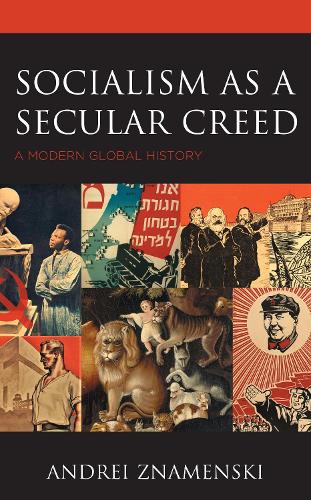
Socialism as a Secular Creed: A Modern Global History
(Hardback)
Available Formats
Publishing Details
Socialism as a Secular Creed: A Modern Global History
By (Author) Andrei Znamenski
Bloomsbury Publishing PLC
Lexington Books
29th January 2021
United States
Classifications
Professional and Scholarly
Non Fiction
Far-left political ideologies and movements
Left-of-centre democratic ideologies and movements
335.009
Winner of Book of the Year: Understanding the World 2021
Physical Properties
Hardback
494
Width 161mm, Height 228mm, Spine 41mm
903g
Description
Andrei Znamenski argues that socialism arose out of activities of secularized apocalyptic sects, the Enlightenment tradition, and dislocations produced by the Industrial Revolution. He examines how, by the 1850s, Marx and Engels made the socialist creed scientific by linking it to history laws and inventing the proletariatthe chosen people that were to redeem the world from oppression. Focusing on the fractions between social democracy and communism, Znamenski explores why, historically, socialism became associated with social engineering and centralized planning. He explains the rise of the New Left in the 1960s and its role in fostering the cultural left that came to privilege race and identity over class. Exploring the global retreat of the left in the 1980s1990s and the great neoliberalism scare, Znamenski also analyzes the subsequent renaissance of socialism in wake of the 20072008 crisis.
Reviews
Andrei Znamenski's history is told with verse combined with scholarship, comparable to old classics such as Wilson's To the Finland Station and Koakowski 's Main Currents of Marxism. Any fair-minded leftist will be brought up short. Read it.
-- Deirdre Nansen McCloskey, professor emerita, University of Illinois at ChicagoAndrei Znamenski, who experienced socialism firsthand, recalls the murder, mayhem, ethnic cleansing, arbitrary detentions, corruption, starvation, labor camps, warfare, forced disappearances, and famine that resulted from Marxism and its various iterations and offshoots. Socialism as a Secular Creed meticulously traces the concrete consequences of the spread of these ideologies, which, he suggests, displaced traditional expressions of religion and established secular eschatologies. His rigorously researched account is not to be missed.
-- Allen Mendenhall, Troy UniversityAuthor Bio
Andrei Znamenski is professor of history at the University of Memphis.
